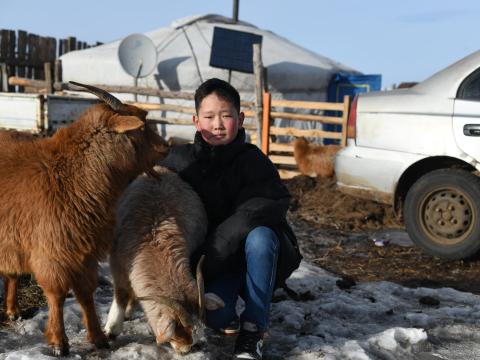Supporting Dzud-affected herder families with multi-purpose cash

“It is getting worse every year. If it was not for the help we received, we would have lost 30 more,” shares 50-year-old Uyanga, a herder in the province of Khentii.
Uyanga said that livestock mortality has been increasing as the weather gets more extreme over time. Last year, he lost 20. He was hoping for a better turnout this year. However, during the 2022 summer, the country was struck with drought, leading to poor pastures. Data from the national statistics office shows that Mongolia has registered over 560,000 livestock deaths as of March 2023, which is 10% higher compared to the same period in 2022. Dzud is also getting more frequent. Historically, dzud occurs once or twice a decade, but the phenomenon has recently become more frequent with worsening impact, due to climate change and human activities like overgrazing.

Giving herders purchasing power through multi-purpose cash
Through World Vision’s Anticipatory Action initiatives, resources were deployed to help families like Uyanga mitigate the impact of Dzud. This included the distribution of multi-purpose cash worth 300,000MNT or about $90 through a partner financial service provider. The organisation has so far distributed $215,760 cash for over 2,400 families.
“We are thankful for this support. It helped that World Vision gave us the freedom to use the money because we were able to spend it according to our urgent needs. In our case, it was animal feed. Our animals were already weak due to a lack of nutrition. That cash helped us save at least 30 animals,” he explains.
It was in 2018 when World Vision Mongolia first implemented anticipatory actions. The post-distribution monitoring during that period proved the use of cash as a modality to be helpful among herders, with 100% of them saying that the money was either used for animal feed or their families’ needs in preparation for the harsh winter.
What Dzud-related interventions meant for children
For 11-year-old Nyambayar, a World Vision-sponsored child and son of Uyanga, it meant being able to have enough food on the table. At least 80% of rural Mongolians rely on agriculture for living. Without support during Dzud, children’s well-being, particularly their nutrition is most likely to suffer.

“I loved spending time with my parents and playing with them. But during the harsh Dzud, my parents were busier than normal winters and didn't have much time to spend with me. Sometimes I feel sad because I miss my parents' care and attention. I hope that we can have time to play together soon.
I knew that I had to help my parents so I help with household chores, and I also help take care of the livestock. Thank you that we got to save some animals from dying,” says Nyambayar.
To date, World Vision Mongolia has reached over 16,000 people, over 8,600 of whom are children, through its anticipatory action and ongoing relief phase. The organisation, through the generosity of its child sponsors, donors, and partners, has distributed food, child kits including warm clothes, sanitary items and stationery, animal feed that includes hay and fodder, and multi-purpose cash.